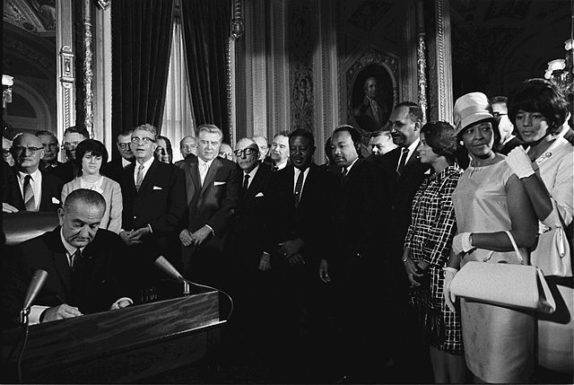
April 6, 2017; BusinessWire
Last month, NPQ reported on the efforts of the National Council of Nonprofits (NCN) as part of a broad-based nonprofit coalition to voice its support for the Johnson Amendment, the provision of the 1954 tax code revision that prohibits 501(c)(3) organizations, including churches, from engaging in partisan political activity in support of or opposing a candidate for public office. The collaborative’s work produced a letter cosigned by almost 4,500 nonprofit organizations “from every state and every segment of the charitable and foundation communities” supporting the current law and opposing any repeal effort.
Almost unknown until the 2016 presidential campaign, the amendment’s repeal was championed by President Trump as a component of his platform. On the campaign trail, Trump said the Johnson Amendment “denies your pastors their right to free speech, and has had a huge negative impact on religion.” During remarks at the 2017 National Prayer Breakfast in February, he said, “I will get rid of and totally destroy the Johnson Amendment.”
NPQ’s editors wrote and published an article in February expressing support for the Johnson Amendment, echoing many of the arguments in the letter.
Free speech with few limits is a very American perspective. Allowing nonprofit organizations to join more openly into the political conversation is not inherently controversial. But allowing them to become fundraising engines for candidates and parties would change the philanthropic landscape and ultimately make it harder for the nonprofit sector fulfill its core purposes, which includes campaigning for social change.
Sign up for our free newsletters
Subscribe to NPQ's newsletters to have our top stories delivered directly to your inbox.
By signing up, you agree to our privacy policy and terms of use, and to receive messages from NPQ and our partners.
Tim Delaney, president and CEO of NCN, said in a press release:
Nonpartisanship is vital to the work of charitable nonprofits. It enables organizations to address community challenges, and invites the problem-solving skills of all residents, without the distractions of party labels and the divisive partisan politics that currently bedevils our country. Indeed, current law is the reason that charitable nonprofits are trusted safe havens from partisanship, a place where people can come together to actually solve community problems rather than just posture and remain torn apart.
The GiveVoice.org website includes history and background information on the Johnson Amendment as well as a state-by-state list of the letter’s signers. It also includes links to other organizations’ letters and statements in support of the current law along with editorials and opinion pieces expressing similar views.
Opposition to repeal or changes to the Johnson Amendment are coming from other coalitions of nonprofit organizations. A letter was sent to members of Congress by 99 religious groups last week. “Faith ought to be a source of connection and community, not division and discord,” the letter said. “The charitable sector, particularly houses of worship, should not become another cog in a political machine or another loophole in campaign finance laws.” The American Society of Association Executives (ASAE) has a membership primarily made up of 501(c)(6) nonprofits, which are not subject to the Johnson Amendment, but some members are 501(c)(3) organizations or have related 501(c)(3) foundations. In its reporting on the letter, ASAE lends its support to the work by nonprofits and sector advocates.
U.S. Rep. Walter Jones (R-NC) has introduced the one-page H.R. 172 to repeal the Johnson Amendment, but the bill has attracted only one cosponsor to date. It has been assigned to the House Ways and Means Committee for hearings, but no action has been taken so far. This lack of urgency may be a sign that efforts to oppose repeal are timely and that the proposal may not be nearly as important to Congress as Trump made it appear. This is not an argument for complacency. Rather, it means that continued advocacy for keeping 501(c)(3) nonprofits out of partisan political campaigns has a good chance to be successful.—Michael Wyland
Clarification: The director of communications and operations for the National Council of Nonprofits reached out to us to emphasize that the Council is not in a leadership role in this effort, and that this was a collaborative initiative among ten organizations.












